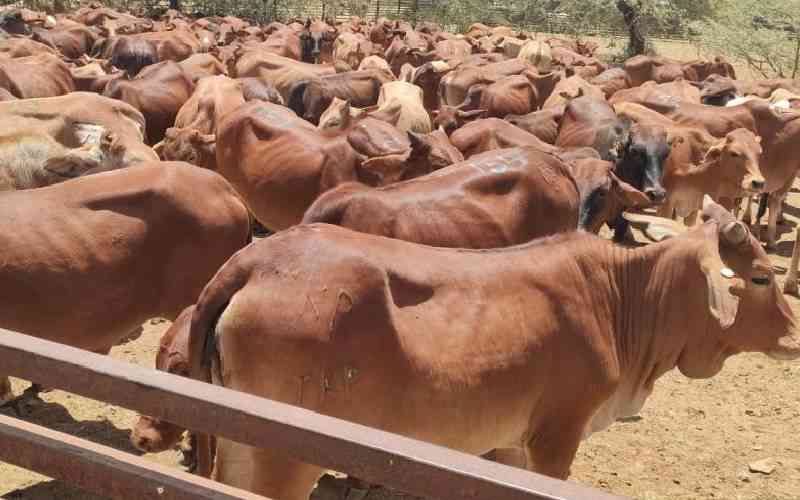
As Kenyans usher in the New Year they will collectively breathe a sigh of relief having seen off 2023.
The just-ended year is one to forget for a majority of Kenyans, having been characterised by economic hardship, political uncertainty, and relentless cost-of-living crisis.
And now as the sun rises in 2024, a flicker of optimism peeks through the clouds. Kenyans are choosing to look ahead with guarded hope. They yearn for a fresh start, a chance to leave behind the burdens of the past year and build a brighter future.
However, optimism is laced with trepidation. The scars of 2023 run deep. The wounds inflicted by inflation, job losses, and political turmoil will take time to heal.
Kenyans remain wary of the challenges that lie ahead: The ever-present shadow of the economic downturn: The ripple effects of global inflation continue to be felt in Kenyan households. Food prices remain high, unemployment is a constant threat, and businesses struggle to stay afloat.
Below are some of the key economic events to shape the New Year.
Hustler Nation vs. Rising cost of living: Ruto's economic tightrope
- PS Kimtai: Treasury ignored Ruto's request for health project funds
- Key health projects at risk as Treasury cuts budget
- Eastern Africa paves way for a greener future in bioeconomy
Keep Reading
The Kenya Kwanza administration under President William Ruto is facing a critical challenge: balancing the need to raise revenue through taxes with the rising cost of living that is causing pain to many Kenyans.
Previous tax proposals have drawn criticism from some Kenyans and various interest groups as well as the Raila Odinga-led Azimio, arguing the cost of living is already too high, leaving no room for additional taxes.
The Kenya Kwanza government says it has "no other option" but to implement painful economic measures such as those prescribed by the International Monetary Fund (IMF) and the World Bank programmes through the budget cycles as a condition to revive the cash-starved economy through their generous but conditional bailouts.
Kenya, the IMF and the World Bank have agreed on lucrative loan programmes running into trillions of shillings to help support the cash-starved Kenya Kwanza administration.
Ballooning inflation, escalating borrowing costs, and a strong dollar have made repaying sovereign loans and raising money significantly more expensive for Kenya amid fears of default.
The cash shortage crisis has seen the government struggle to pay civil servants and disburse funds to the counties and schools.
The shilling has also weakened sharply against the dollar, piling further pressure on Kenyans amid a cost of living crisis that has pushed many into poverty and fuelled demonstrations.
Ticking Clock: Can Kenya defuse the Sh312 billion Eurobond bomb in June?
The government sidestepped an economic landmine after settling a crucial instalment on one of its maturing international bonds through a last-minute interest payment.
The National Treasury made a Sh10.8 billion "coupon" payment for the $2 billion (more than Sh312 billion) Eurobond ahead of the last international banking working day in December.
Even then, there are jitters over Kenya's debt distress after the government backtracked on an initial repayment plan trumpeted by President Ruto, say analysts.
There has been mounting anxiety and speculation on whether Kenya would default on its obligations.
The recent $68.7 million interest payment plan was a departure from President Ruto's earlier intention to buy back part of the $2 billion Eurobond, signalling financial distress.
Ruto earlier said his administration planned this month to pay off the first $300 million (Sh46 billion) instalment of the $2 billion Eurobond debt that is due next year in June.

The President's initial plan had, however, sparked negative sentiments with global ratings agency Moody's equating it to a default.
Kenya will be watched closely with a new wave of sovereign debt defaults and restructurings underway across the world.
Early December, Central Bank of Kenya Governor Kamau Thugge revealed the county had suffered a setback after receiving only part of the expected proceeds to conduct the Eurobond buyback from the Trade Development Bank. The December payment averted disastrous economic consequences caused by a default, said analysts.
Kenya Kwanza administration officials have been burning the midnight oil seeking to avoid a default on the Eurobond debt - an unprecedented move for a country that has never before defaulted on debt, which would have far-reaching and long-lasting implications.
Economies like Greece, Zambia, Lebanon and Argentina have shown that a default could herald an unprecedented economic downturn.
In the event of a default, credit rating agencies would further downgrade the country. A default would also impact Kenya's ability to borrow in the international markets in future, as global lenders would demand higher interest rates.
This is comparable to an individual's credit score, affecting how likely it is for a bank to grant them a loan.
For a country, it is a situation that can take decades to recover from. The decline in investor confidence, limited credit availability and higher borrowing costs can significantly impact business investment, consumer spending and overall economic activity.
Additionally, budget constraints may lead to an increase in the unemployment rate, a decrease in government revenue and a reduction in essential public services.
This economic decline has the potential to trigger a cycle of slower growth, increased debt payments and financial strain.
Defaulting on a loan can exacerbate social injustices and financial problems, which in turn can ignite protests and other forms of political unrest.
Government-imposed austerity measures such as budget cuts, reduced public services and higher taxes are often the consequence of a default.
"The final interest payment on this Eurobond is scheduled for the last week of June 2024, alongside the repayment of the principal amount of $2 billion," said the Treasury.
Kenya will be in the spotlight on its repayment plan at a time when Ethiopia recently became Africa's third default in as many years after it failed to make a $33 million "coupon" payment on its only international government bond.
Empty bellies, angry streets: Cost of living triggers opposition resurgence
Azimio leader Raila Odinga recently announced the return of street protests popularly known as maandamano to agitate for lowering of the cost of living in 2024.
Speaking in Nyanza, the opposition leader blamed the Ruto government for increasing taxes which have led to a tough economic situation across the country.

Businesses and investors took a hit running into billions of shillings last year following mass protests called by Azimio.
President Ruto's administration, which took over in September 2022, has been under pressure to bring down the cost of living. Some of the proposed tax measures have been questioned by various interest groups.
But while at the risk of rattling its low-income base (hustlers), who largely voted for it, the government has doubled down on several rounds of tax, governance and monetary policy reforms as part of IMF and World Bank-backed revenue-raising measures with the government.
It is these measures as presented in successive budgets of the Ruto administration that have now stoked fears of a return to painful measures that have resulted in civil servants losing their jobs and increased taxes.
Kenya's recent budget proposals have been seen to be in line with IMF calls to see Kenya shrink its deficits - through tax hikes and spending cuts - in what various interest groups say will cause far more economic damage than experts had assumed.
The Ruto government has already done away with maize and the fuel subsidies that had been put in place by the previous regime, exposing Kenyans to high cost of living.
The Kenya Kwanza government has since rolled back all measures that were put in place to cushion Kenyans against the effects of Covid-19.
With inflationary pressures expected to continue, the cost of living, which has generally gone up, is expected to worsen, with many Kenyans still reeling from the effects of Covid-19, which saw a majority of them lose their livelihoods.
In making the budgets, the government has been under pressure to find a balance between reforms to satisfy IMF and the World Bank and measures to win over and shield hard-pressed consumers from the cost-of-living crisis, analysts say.
From Public to Private: Will Ruto's privatisation gamble usher in prosperity?
President Ruto's plan to privatize key state assets in Kenya has sparked heated debate, with potential benefits and risks on the table.
The Ruto government plans to sell 11 more state agencies, including the Kenyatta International Convention Centre and the cash-rich National Oil and Kenya Pipeline Company.
The National Treasury has also listed the Kenya Literature Bureau, Mwea Rice Mills Ltd, Western Kenya Rice Mills Ltd, New Kenya Cooperative Creameries Limited and Numerical Machining Complex Limited as potential investment opportunities for interested parties.
The Kenya Vehicle Manufacturers Limited, Kenya Seed Company Limited and Rivatex East Africa Limited are also among the agencies lined up for sale by the government.
The National Treasury said the entities to be put up for sale will help it raise additional revenue.
Proponents argue that privatization can attract new investments, create jobs, and improve efficiency in stagnant state-owned enterprises. This could lead to higher economic growth and increased tax revenue for the government.
Private companies, driven by competition and profit motives, might be more efficient and responsive to consumer needs than state-owned entities.
If privatization is not done transparently and inclusively, it could benefit wealthy individuals and corporations at the expense of ordinary Kenyans. This could lead to wider income inequality and social unrest.

Privatization can sometimes lead to job losses in inefficient state-owned enterprises. This could exacerbate unemployment and poverty, especially in sectors where large numbers of people are employed by the government.
Selling off strategic assets like ports and utilities could also give foreign companies or powerful cartels excessive control over vital sectors of the economy. This could raise concerns about national security and sovereignty.
Earlier estimates showed the government could earn a windfall of as much as Sh30 billion a year from selling troubled state-owned enterprises (SOEs).
According to a report by budget experts in Parliament, these earnings could surpass Sh110 billion in the near term.
The budget experts believe the planned privatisation programme will be useful for the cash-strapped government, especially at a time when the Ruto administration faces a narrowing fiscal space to roll out its policies, amid high debt repayment obligations.
"The privatisation programme can lead to proceeds worth Sh30 billion annually," said the report.
There are 248 State Corporations in Kenya, and it is estimated that the privatisation programme will primarily target commercial enterprises that account for 19 per cent of total state corporations.
The sale of the troubled agencies aims to improve their performance and fill the state's coffers amid high levels of public debt.
Governance experts earlier said the large fiscal windfall associated should be ring-fenced to avoid misuse and to help Kenya boost development and improve the standards of living for citizens through access to key services and amenities such as roads, health, food security, and education.
Proceeds could also help offset Kenya's mountain of public debt, which has surpassed the Sh10 trillion ceiling.
Loan pain persists
Interest rates will keep Kenyan borrowers in limbo in 2024. The high rates could crush Kenyans' hopes for owning homes and even starting businesses. It is also likely to be a Double Whammy as inflation and rates squeeze borrowers as Kenya enters 2024.
Power pinch persists:
Rising energy prices are likely to threaten Kenyan households and businesses in 2024. Kenyans have been feeling the heat as electricity and fuel costs stay high in 2023 and it remains to be seen whether Kenyans will afford to Keep the lights on in 2024.
 The Standard Group Plc is a multi-media organization with investments in media platforms spanning newspaper print
operations, television, radio broadcasting, digital and online services. The Standard Group is recognized as a
leading multi-media house in Kenya with a key influence in matters of national and international interest.
The Standard Group Plc is a multi-media organization with investments in media platforms spanning newspaper print
operations, television, radio broadcasting, digital and online services. The Standard Group is recognized as a
leading multi-media house in Kenya with a key influence in matters of national and international interest.











